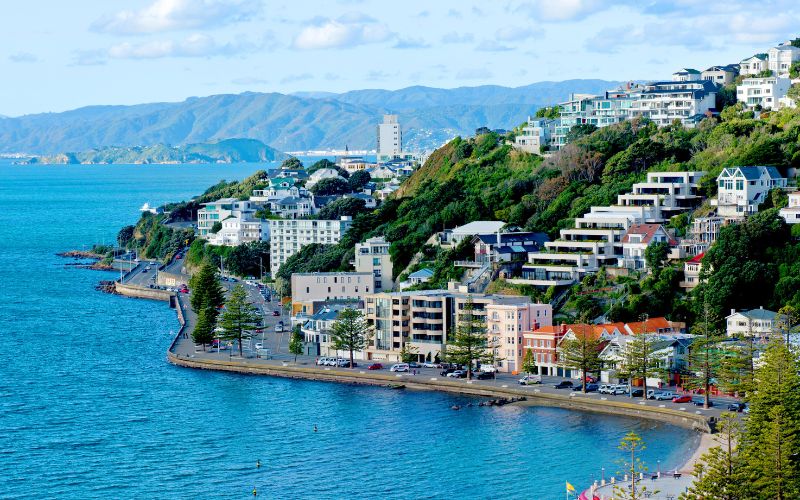Kāinga Ora, known as Homes and Communities, plays a pivotal role in providing public housing in New Zealand. Serving as a cornerstone of community welfare, this organisation is responsible for fostering the availability of quality homes that are affordable and accessible.
But, what is Kainga Ora, exactly? It’s a government entity with the mission to create sustainable, inclusive communities where residents can prosper.
Established with an aim to address the housing crisis, Kāinga Ora amalgamated several existing agencies to streamline efforts in housing development and provision.
If you’re exploring options for housing in New Zealand or you’re interested in understanding the country’s approach to public well-being, knowing about Kāinga Ora’s functions and its significance in the housing sector could be highly beneficial.
They manage thousands of properties and ensure a smooth operation of the housing system to meet the diverse needs of residents.
Whether you’re a potential tenant, a stakeholder in urban development, or simply keen on housing policy, Kāinga Ora is a term you’ll likely encounter.
As a public landlord and a leader in urban redevelopment, it provides homes and revitalises communities through collaboration with various partners, aligning with the wider objectives of New Zealand’s urban development strategies.
Table of Contents
What is Kāinga Ora?
Kāinga Ora plays a role in shaping the future of housing in New Zealand, offering both social housing solutions and spearheading urban development projects.
Origins and Purpose
Kāinga Ora, also known as Homes and Communities, traces its roots to the vision of reshaping New Zealand’s housing landscape. Its purpose is grounded in addressing the country’s need for high-quality, accessible housing, and fostering community well-being. This governmental entity emerged from a need to consolidate housing efforts and focus on long-term outcomes for New Zealanders.
Role and Responsibilities
As a Crown agency, Kāinga Ora has a multi-faceted role. First and foremost, it functions as a public housing landlord, managing a significant portfolio of properties and ensuring that they meet the needs of residents. Beyond landlord duties, Kāinga Ora is instrumental in urban development projects, revitalising communities and working in partnership with local bodies, iwi, and private entities. Under the Homes and Communities Act, it also collaborates closely with the Ministry of Housing and Urban Development to align with broader government objectives. This collaboration touches on important aspects of urban living, from social housing provision to large-scale development initiatives that aim to revamp urban spaces across New Zealand.
Key Services and Programmes

Kāinga Ora – Homes and Communities offers a range of services and programmes to support the development of thriving communities and the provision of affordable housing in New Zealand.
Affordable Housing Support
Your journey to homeownership might be easier with support from Kāinga Ora, which provides multiple avenues to help you purchase your first home. Assistance such as the First Home Grant and First Home Loan encourage individuals and families to step onto the property ladder in a manner that’s more financially viable.
Iwi and Māori Development
A strong partnership with Iwi and Māori is at the heart of Kāinga Ora’s approach, working collaboratively to ensure flourishing communities. The Māori Strategy illustrates this commitment by prioritising the wellbeing of Māori families and supporting them toward sustainable homeownership.
Urban Development Initiatives
Kāinga Ora is a key player in large-scale urban development projects, aligning strategy with urban design to foster communities that are not just houses but homes.
For example, their involvement in significant urban development initiatives revitalises neighbourhoods by providing public housing and invigorating the neighbourhoods with the infrastructure needed for communities to prosper.
Kainga Ora First Home Grant Criteria
When you’re looking to step onto the property ladder, the Kāinga Ora First Home Grant can be a real helping hand. If you’re a KiwiSaver member, this grant might be the boost you need.
Here is some of the eligibility criteria:
- Income Cap: You need to have earned below certain income thresholds in the last twelve months.
- KiwiSaver Participation: Regular contributions to your KiwiSaver for at least three to five years are a must.
- You must be aged over 18.
- Additionally, being a New Zealand citizen or holder of a resident visa is a prerequisite.
- The type of home you wish to purchase plays its role, as there are caps on the value of the property.
- Not currently owning property is essential to qualify.
For a detailed run-down, visit the guidelines on the Kāinga Ora website. Taking a look at these criteria can help you assess whether the First Home Grant can be part of your journey to owning your very first home.
Remember, the grant can provide up to $10,000 to aid in your purchase, so getting your ducks in a row is well worth the effort!
Creating Thriving Communities

Kainga Ora is tasked with the development of community housing that contributes to thriving communities. The focus is on creating safe places to live that foster social wellbeing. Projects often include a mix of public and affordable housing that enables diverse groups to find homes suited to their needs. By prioritising the wellbeing of residents, Kainga Ora addresses issues such as homelessness and ensures that communities have the infrastructure they need to flourish.
- Key strategies include:
- Building quality infrastructure
- Integrating amenities for community use
- Designing safe and inclusive spaces
- Engaging with the community to identify and cater to local needs
By implementing these strategies, community housing becomes more than just homes but vibrant hubs where people feel connected and supported.
Cultural and Economic Advancement
Kainga Ora recognises the importance of cultural wellbeing in its developments. Māori interests in the land are identified and protected, ensuring that Iwi have a stake in how their ancestral lands are used. This respect for cultural heritage plays a crucial role in fostering cultural wellbeing within communities.
From an economic standpoint, Kainga Ora initiatives also contribute to employment opportunities. By focusing on sustainable construction and development practices, these projects create jobs and promote economic growth within communities.
- Economic and cultural benefits include:
- Providing employment opportunities during and post-construction
- Encouraging local businesses by increasing demand
- Upholding the cultural heritage and values of local iwi and hapū
Through these collaborative efforts, Kainga Ora not only builds homes but also supports the economic and cultural prosperity of New Zealand communities.
Strategic Partnerships and Collaboration
Kāinga Ora not only creates homes but also fosters strong relationships through strategic partnerships and collaboration with various entities. These relationships are pivotal in shaping the housing landscape in New Zealand.
Government and Agency Coordination
Your understanding of Kāinga Ora’s approach to collaboration should start with its engagement with central government entities and agencies. The Crown agency actively coordinates with entities like the Ministry of Housing and other government bodies to align strategies and deliver on shared objectives for housing and urban development. These efforts are streamlined through co-designed frameworks and initiatives such as the MAIHI Ka Ora – National Māori Housing Strategy, which underscore the importance of an integrated approach to address housing needs.
You’ll notice that through various strategic documents and engagement reports, these partnerships are not just on paper—they’re actioned through targeted strategies such as Asset Management and Environment strategies, which work towards achieving a future-proof housing system in Aotearoa.
Engagement with Iwi and Māori
Iwi and Māori are at the heart of Kāinga Ora’s partnership ethos. Your interaction with the housing sector is directly influenced by Kāinga Ora’s commitment to meaningful engagement with Māori communities. The organisation has co-designed the housing strategies, emphasising the significance of shared priorities and the intent to jointly address them.
For instance, by delving into the Strategic Engagement Report, you’ll understand how these collaborations go further than discussions—they result in strategic plans that incorporate the perspectives and needs of Māori, as seen in the Supported Housing and Partnerships Strategic Plans. This inclusive framework not only strengthens the housing sector’s capability but also ensures that your communities are part of the journey towards a better future in housing and urban development.
Governance and Leadership
In grasping the structure of Kāinga Ora, you’ll find that its governance and leadership pivot around a meticulous framework. Emphasising accountability, this framework ensures a robust direction for New Zealand’s largest residential landlord.
The Board of Kāinga Ora
The Board of Kāinga Ora encompasses a group of appointed members entrusted with strategic oversight. They work closely with the Housing Minister, Hon Christopher Bishop, who plays a crucial role in setting the agency’s course. With their collective expertise, the board navigates through policies and decisions, aiming to meet the housing needs effectively and sustainably.
Executive Management
Under the direction of the board, the Executive Management team, including key figures such as CEO Andrew McKenzie, is crucial. This team is charged with executing the strategies and policies ordained by the board. Their actions reflect a concerted effort to provide housing and steer urban development initiatives throughout the nation.
Challenges and Opportunities

In your journey to understand Kāinga Ora, it’s crucial to consider the headwinds and tailwinds it faces in addressing New Zealand’s housing needs. Here we’ll navigate the duality of trials and triumphs, particularly focusing on housing shortages and environmental sustainability.
Addressing Housing Shortages
New Zealand’s housing crisis is a demanding hurdle that Kāinga Ora must leap over. With affordable housing slipping out of reach for many, the agency has the tall task of increasing the supply to quell the market’s appetite. This effort means steering through complex procurement processes and adhering to legislation that shapes the capacity to build more public and rental housing. For you, the potential for urban design innovation here is vast, promising more homes for those in need.
Environmental Sustainability
As you read into Kāinga Ora’s environmental responsibilities, it’s clear that every brick laid must consider its ecological footprint. The organisation is in a unique position to pioneer urban design principles that serve both the environment and the community. Kāinga Ora integrates sustainable building practices to ensure that development projects align with preserving New Zealand’s natural beauty. Your awareness of Kāinga Ora’s potential to set benchmarks for eco-friendly living spaces can inspire hope for a greener housing sector.
Financial and Development Framework
You need to know that Kāinga Ora’s framework encompasses strategic financial planning and the systematic development of properties which aim to improve well-being outcomes for New Zealanders.
Funding and Investment
Kāinga Ora’s finance strategy includes sustainable funding options aligning with international guidelines. Your investment in Kāinga Ora supports the delivery of urban development projects, enhancing community living standards. Notably, their Sustainable Finance Framework aims to marry financial and physical capital for long-term benefits.
Property Development Process
When it comes to their property development process, Kāinga Ora utilises a robust procurement approach to ensure taxpayer funds are effectively managed. Your understanding of Kāinga Ora will be incomplete without acknowledging the role of the Finance Minister in overseeing the entity’s financial health, including its debt and funding arrangements which are essential for achieving targets in housing and community development.
Public Engagement and Feedback
In your interaction with Kāinga Ora, you’ll find that they place a strong emphasis on community feedback and transparent reporting. This is crucial for the organisation to support and align with the communities where development takes place.
Community Feedback Mechanisms
Kāinga Ora is committed to engaging with communities through various channels. During the strategic planning phase, you have the opportunity to attend online engagement hui, which are forums where opinions and thoughts are actively encouraged. This interaction helps shape Kāinga Ora’s development strategies, ensuring that community needs are heard. Input from these sessions can lead to the implementation of Māori-led urban development solutions, reflecting the unique partnership that Kāinga Ora fosters with Māori as key urban development partners.
Transparency and Reporting
Every piece of feedback you provide influences Kāinga Ora’s operations. They aim to be as transparent as possible with this process. Following community engagement, feedback is compiled into a report. This document is instrumental in informing the final development plans, and you can expect public releases of these reports for full transparency. Moreover, annual reports and independent reviews act as tools for you to gauge Kāinga Ora’s performance and commitment to creating thriving communities.
Related Legislation and Policies

You’ll find that Kāinga Ora – Homes and Communities is deeply intertwined with several pieces of legislation and policies, which guide its functions and operations.
- The Kāinga Ora – Homes and Communities Act 2019 is the cornerstone, establishing the organisation’s objectives and governing principles.
- Urban planning is subject to the Resource Management Act (RMA), which details how natural and physical resources are managed in New Zealand.
Regarding health and safety, Kāinga Ora must comply with:
- The Health and Safety at Work Act (HSWA) 2015, ensuring all operations meet the country’s workplace safety standards.
In terms of building regulations, Kāinga Ora abides by:
- The Building Act 2004, which provides a comprehensive framework for building construction and maintenance to ensure safety and quality.
Additionally, they must adhere to policies such as:
- Housing Improvement Regulations 1947, focusing on the conditions of residential tenancies.
- Emergency response measures are detailed in the Fire and Emergency New Zealand Act 2017.
Kāinga Ora is also influenced by higher-level policy statements:
- The Government Policy Statement on Housing and Urban Development outlines expectations for housing strategies and development, found within strategies like Kāinga Ora Strategy 2030.
These laws and policies inform Kāinga Ora’s approach to housing development and community planning, ensuring that its efforts align with national standards and strategic goals.
Frequently Asked Questions
When you’re exploring options with Kāinga Ora, you likely have several questions about the grants and services it provides. Below are some of the key questions answered to guide you through.
What is the Kainga Ora First Home Grant?
The Kainga Ora First Home Grant is financial assistance provided by Kāinga Ora – Homes and Communities to help you purchase your first home. If you’ve regularly contributed to your KiwiSaver for at least three years, you might be eligible for this grant.
How much is the Kainga Ora first home grant?
The amount you can receive from the Kāinga Ora first home grantranges up to $5,000 for existing homes and up to $10,000 for new builds or land purchases to build a new home. Keep in mind, there are price caps depending on the region you’re buying in.
How Does Kainga Ora Work?
Kāinga Ora works by providing housing solutions for individuals and families in need. It operates rental housing services and offers grants and partners with other organisations to facilitate community housing developments. Their mission is to ensure wellbeing through quality homes and thriving communities.
How to Apply for Kainga Ora?
To apply for Kāinga Ora support, you’ll want to first check your eligibility. If you meet the criteria, you can then register and complete the application process, which may include financial criteria and documentation of your KiwiSaver contributions.
Is Kainga Ora First Home Partner Still Available?
No. The Kāinga Ora First Home Partner scheme was closed in November 2023.


